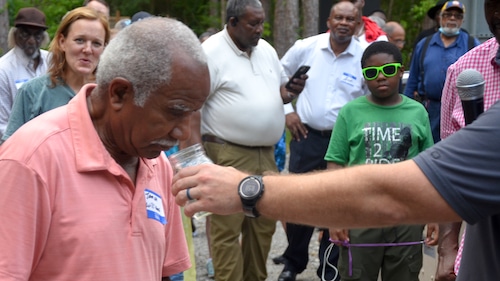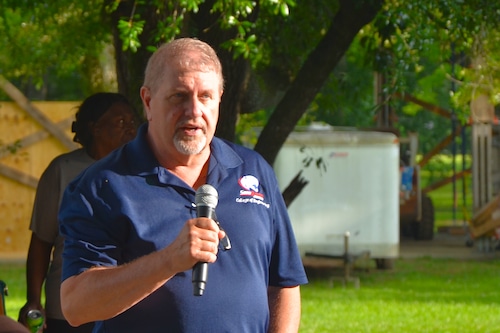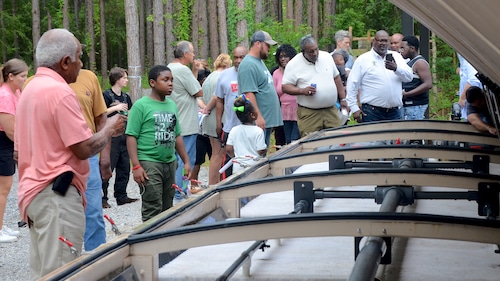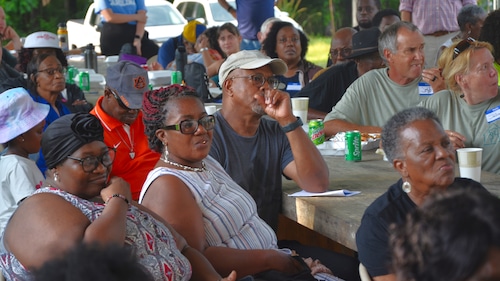
The town of Newbern doesn’t have a lot to it. There are a handful of churches, of course, some empty storefronts along Alabama Route 61 and about 133 people living in older houses or mobile homes scattered throughout the area.
But soon the tiny town in Hale County will have a 3-inch sewer line running north to south through the heart of town, a potential lifeline to bring a modern, working sanitation system to an area that desperately needs it.
Civil engineering professors at the University of South Alabama, Auburn University, and the University of Alabama have been working on designing a new kind of hybrid sewer system that can meet the inherent challenges of Alabama’s Black Belt, and now there is a working prototype in Newbern.
“If your septic tank doesn’t work, what do you do?” said Kevin White, civil engineering professor at the University of South Alabama. “You really don’t have much of an option. And that’s what we’re trying to address, creating an option.”
Currently many residents are stuck with septic tanks that don’t work and back up into their homes or have resorted to discharging their waste into the woods near the house, a method called “straight-piping.”
Newbern was selected from among many struggling communities in Alabama’s Black Belt to be the site of the pilot program.
“This is a very impactful project that not only could impact positively Newbern and Hale County, but lots of places all over the country,” White said.
Technically, White is retired from USA, but after working more than 10 years on the Black Belt sanitation issues, he said he couldn’t walk away now that it was so close to becoming reality.
About 140 people attended a ribbon-cutting ceremony for the pilot project Tuesday evening at Auburn University’s Rural Studio in Newbern, and cheered when the yellow ribbon was cut. Organizers say that included 93 people who live in or around Newbern, which only has 133 residents, per the 2020 Census.
“I’m very excited to see something run down through Newbern because we don’t have this often,” said Essie Sneed. “This is the first time something like this has happened to us.”
Sneed said she has a septic tank, but it doesn’t really work the way it’s supposed to.
“Our septic tank, it does have a smell to it. Mine comes up through my commode in my house and there’s a smell sometimes coming into my house.”

In terms of unique challenges, Black Belt soil in many places is a heavy clay that doesn’t allow water to flow through, which means most septic tank systems won’t function well, if at all.
Second, the population of the rural Black Belt tends to be very spread out. Running a full sewer line out to such a small number of dwellings would be impractical and tremendously expensive.
That’s a problem in an area where the median household income is $33,625.
So the engineering professors — led by White, Mark Elliott from the University of Alabama and Mark Barnett from Auburn – began to develop a new kind of system that can address the public health issues of untreated sewage discharges but keep costs low enough that people can afford it.
Poor sewage treatment creates public health risks and poor living conditions for residents who are exposed to potential disease and definite bad smells. But it also harms economic development, and scares away potential businesses from the area.

The system uses on-site septic tanks at the homes to collect solid wastes. However, unlike traditional septic systems, the liquid waste will be pumped up to 5 or 6 miles in the 3-inch PVC lines to a centralized treatment facility.
Those 3-inch lines are much cheaper to install and maintain than a full sewer line, and the treatment station will only have to deal with liquid waste. The clustered system will ideally treat liquid waste from about 150 homes within a five-mile radius, keeping the cost per household manageable.
At Tuesday’s demonstration, White and the engineers opened the hatches on the new treatment center and showed residents that there was no detectable odor, and the finished water came out roughly as clear as the creek where it will be discharged.
Newbern resident James Williams took a whiff out of a glass jar of treated water during the demonstration to attest to the lack of odor.
Wastewater issues become a priority for Biden
Sanitation issues in the Black Belt have been rampant for decades, largely due to the poverty, non-permeable soil and low population density.
But over the last several years, these issues have been under a new spotlight and fixing them become a priority for the President Joe Biden’s Administration since 2021.
“The president has directed us to fix that problem,” U.S. Secretary of Agriculture Tom Vilsack said in a visit to Alabama’s Black Belt in 2022.
The Biden Administration also chose to investigate a civil rights complaint against Alabama that had laid dormant under predecessor Donald Trump. In 2023, a settlement between the Justice Department and the Alabama Department of Public Health committed the state to fixing widespread sewage issues in Lowndes County, one of the most impacted locations.
While Newbern isn’t in Lowndes County, it’s hoped that Newbern will provide a roadmap for how to bring effective wastewater treatment to poor, rural communities with challenging soil conditions.
The Newbern pilot project was funded by the Alabama Department of Environmental Management and Columbia University.
Also contributing to the project is a team from the University of North Carolina, led by Joe Brown, a Selma native who is now a professor of environmental sciences and engineering at UNC.
Brown and the North Carolina team will study the public health aspects of the project, testing the water, wastewater and soil in Newbern, as well as conducting surveys among residents to evaluate potential benefits of the project.
“We think this is a really innovative system here that can hopefully be applied in many other places, not just in the black belt, but in the United States that need this kind of infrastructure,” Brown said. “So we want evidence to deliver to policymakers, and people who can actually invest in infrastructure, who can direct resources to meet needs.”
What’s next for Newbern?
Currently the treatment system is up and running, but only connected to the buildings at Auburn’s Rural Studio in Newbern and is located on the Auburn property.
Auburn won’t be the ultimate owner of the finished project, so they are attempting to reach an agreement with a municipality or private entity to own and manage the wastewater system.
“Auburn University will never be the operator or the owner of this sanitary sewer for the town,” said Emily McGlohn, an associate professor at Auburn’s Rural Studio. “We can’t do that. But we’ve got to find the right people to do it. We’re going to get over that hurdle next.”

White said the team hopes to begin Phase II of the project by the end of the year, which will involve installing the main sewer line and connecting as many as 60 houses to the system.
At the same time, the team is recruiting residents to connect to the system.
Enthusiasm is high among residents at Tuesday’s event, but many had questions about costs of the monthly sewer bill.
Several residents told AL.com that they were excited about the possibility of connecting to the system.
“It’s something new to me,” said Newbern resident Isaac Sanders. “I’m trying to find some insight on how it works and know how it’s going to keep the community nice and clean.
“Right at the moment, I don’t have a septic tank, so it will be just right for me.”
Patricia Jackson agreed.
“We need a sewer system,” Jackson said. “Right now, people got stuff just running off into the ditch.”
White said details about how much the system will cost aren’t finalized yet. Ultimately, the more people sign up, the lower the cost per user. But, he said, there isn’t expected to be any initial fee to connect and install the system along the pipe routes, and that the monthly fee to the utility company will cover all maintenance and upkeep of the system.
“It’s not some magical thing that’s going to operate on its own and never break down,” White said. “We have to manage it, so that means we have to pay for it.
“We’re trying to keep that that payment absolutely as low as possible.”











